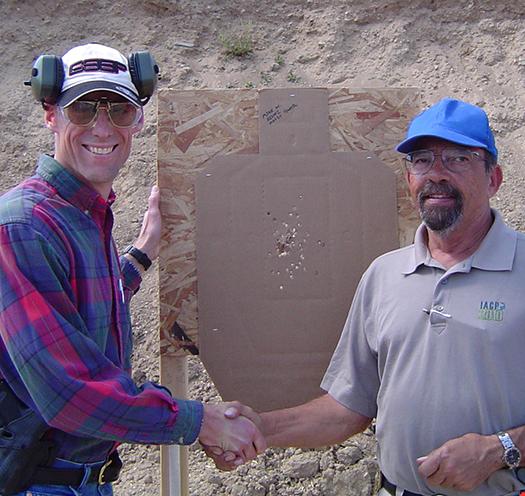Post-Ferguson Interactions With Law Enforcement
by Mike Wood
This past November and December, as most of America was busily preparing for the holidays, our nation’s law enforcement officers were hastily preparing to combat large scale urban riots, surging mob violence, and deadly ambush attacks. To them, the season was not a time of Thanksgiving, Peace and Joy, and Goodwill Towards Man.
In the wake of the politically-charged shooting of Michael Brown (a strong-arm robber who assaulted a police officer and tried to kill him with his own gun) many parts of urban America erupted into chaos. Encouraged by race-baiting opportunists, scoundrel politicians, radicals and the media, large crowds of angry people were whipped up into an anti-cop frenzy and officer injuries mounted as the mobs were incited to riot, arson, loot and commit acts of violence against police officers.
Officers across the United States became the targets of hostility and misdirected anger, as well as scapegoats for failed social policies that have left inner-city America a shambles. When they used justifiable force to defend themselves or the public, or to arrest a violent criminal who would not submit, they were immediately accused of overreaction, or worse, murder. Traditional bases of support eroded. They were accused of widespread racism by no less a figure than the Attorney General of the United States, and the President himself described this seething anger towards the police as “understandable.”
An escalating pattern of violent attacks on law enforcement reached a crescendo in the ambush-style murders of New York Police Officers Rafael Ramos and Wenjian Liu, but the violence didn’t stop there. Another two officers would be murdered before the year was out, bringing the total for November and December alone to eight line-of-duty deaths attributable to assault or gunfire. In some parts of the nation, police officers were even ambushed in their own homes, while off duty.
Suddenly, it seemed like the entire nation was at war with its police.
A Changing Relationship
The majority of Americans still respected their police officers and were supportive of them, but this silent majority wasn’t getting any airtime on TV or radio. Amidst a growing wave of anti-police activities and media coverage, many officers around the nation began to feel vulnerable, isolated, and targeted. Many began to openly express the sentiment that “Ferguson changed everything” in their relationship with the public they served.
And indeed it had. It was almost like the nation had gone backwards in time, to the violent and turbulent late 1960s and early 1970s, where the police were under widespread physical and verbal attack from all corners of society, and law enforcement injuries and deaths reached an all-time high. Even the language of that era made a comeback—it had been decades since the derisive term “pig” was popular with those who opposed the police, but the murderer of Officers Ramos and Liu reintroduced it to a new generation of criminals and radicals.
In places far from Ferguson, MO, officers began to feel the backlash of anti-cop sentiment that had never been stronger in the course of their careers. Worse yet was the growing sense of fear and distrust of police amongst average Americans, stoked by a complicit media. Officers all over the country reported this subtle change in the public psyche—the people that cops used to count on for support were being fed a message that the police were brutal, racist, violent, and could not be trusted.
As the public became increasingly wary of the police, the gap between them seemed to be widening.
The Police and Armed Citizens
This situation has ramifications for Network members who lawfully keep and carry weapons. The relationship between a police officer and a legally armed citizen centers on trust, but if the general relationship between the public and police is eroding, then this places a great strain on the interaction between armed “good guys” on both sides of the badge. This increased tension could have disastrous results, particularly for citizens who lawfully carry concealed weapons in public, so it’s to our benefit to do what we can to reinforce that feeling of trust and mutual respect when we interact with law enforcement as an armed citizen.
To that end, I would suggest the following tips when you encounter a law enforcement officer as an armed citizen:
- Be Respectful. This has always been important, but it’s especially so now when officers feel like they are under constant verbal assault—from criminals and “average” citizens alike. Being respectful towards an officer will go a long way towards establishing your credibility as someone they can trust;
- Be Patient. Officers who prematurely rush into a situation or rush through an encounter can put themselves at great risk. Sometimes they need to move slowly and be methodical, for your safety and theirs. They might have to search and secure an area first before they can respond to your needs, for example. If you are stopped by the police or call on them for help, it’s natural that you’ll be anxious and want your situation to be resolved quickly, but be patient with them and let them work at their own speed;
- Be Helpful. You know that officers want to make safety a priority in every interaction with the public, so help them out. If you’re stopped for a driving violation, for instance, park your car in a safe (away from traffic and other hazards) and well lit location that will reduce the officer’s risk of approaching you. Put your interior lighting on, roll down the windows, turn off the motor, stay in your car, and place your hands in view on the steering wheel so that it makes it easier for the officer to see and hear what you are doing. Don’t make any fast or unexpected moves, and ask for permission to retrieve objects (a license, your CCW permit, etc.) before you move to get them. If an officer is responding to your home, give the police a description of who will meet them on arrival and turn on the lights (inside and outside) before they get there. Don’t meet them at the door with a gun in your hand. You need to be the officer’s partner in ensuring that the interaction with them goes smoothly and safely for all involved;
- Be Professional. If the law or the situation requires you to identify yourself as a CCW permit holder upon initial contact with law enforcement, then do so. Do it in a calm and professional manner, befitting someone who is entrusted with the responsibility of carrying a weapon. Instead of blurting out, “I’ve got a gun!” when the officer comes up to your door on a traffic stop, find a way to notify the officer that you are “lawfully carrying a concealed firearm” (not “packing a gun”–word choice is critical here) in a calm and non-threatening manner. Ask the officer what he would like you to do next, and follow his instructions carefully;
- Be Understanding. Police work is dangerous and getting more so every day. If you were in their shoes, you would probably be nervous and wary too, so don’t be offended if they use precautionary tactics designed to give them the advantage. For example, if an officer stops you while driving in a remote area, don’t be offended if he approaches your car with his hand near or on his duty weapon, or communicates with you from a position that is not directly in front of you. Don’t be offended if a flashlight is shined in your eyes, or if your lawfully carried concealed weapon is temporarily held by the officer until his contact with you is complete. All of this might seem a little unnecessary to you, but try to understand that it’s not personal—it’s all about safety. Also, if the officer is a little grumpy or curt or even distant, try to cut him some slack, just like you would your spouse. You never know what he’s already had to deal with today;
- Be Thick-Skinned. You know that you’re a “Good Guy,” but the officer doesn’t. The officer learned a long time ago about the hazards of judging a book by its cover, so don’t get upset if you’re “being treated like a criminal.” You probably are being treated like a potential threat, for your safety as well as the officer’s. Don’t take it personally;
- Save it for later. If you run into a rude or unprofessional officer (yes, they are out there), don’t argue with him or try to solve the problem right now. Politely comply with his instructions and follow up with a complaint to the appropriate authorities at a later time.
Keeping these tips in mind will help you to repair some of the recent damage to the relationship between the public and their police, and will also ensure everyone’s safety. A simple “Thank You” would also be a nice touch, if you get the chance.
Be safe out there!
__________
Mike Wood is a Network member and the author of Newhall Shooting: A Tactical Analysis. See his website at www.newhallshooting.com for more information. He is shown (left) in the photo above receiving Massad Ayoob's congratulations on a perfect qualification target.
Click here to return to March 2015 Journal to read more.

